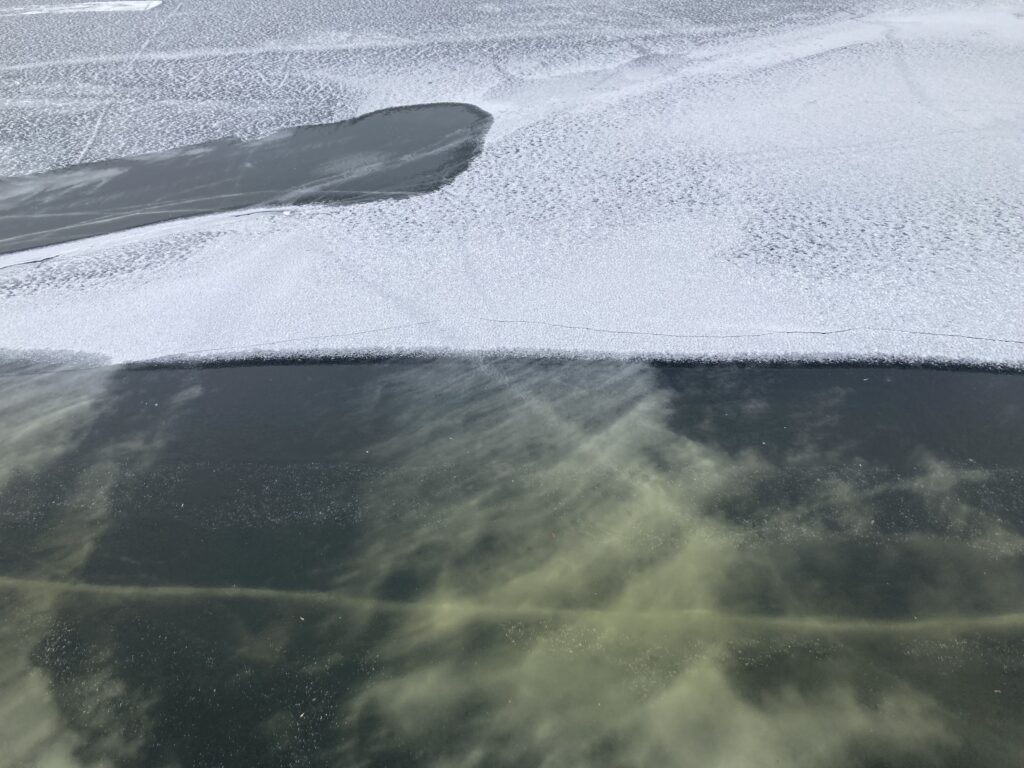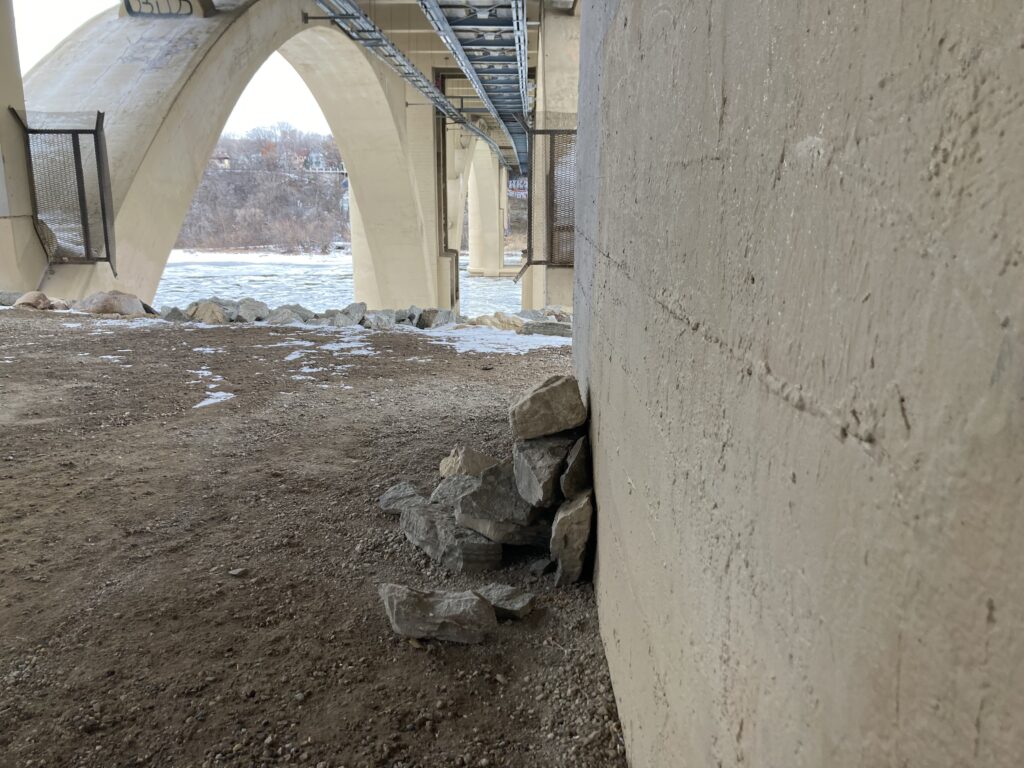4 miles
river road, north/river road, south
67 degrees / dew point: 63
Started my run at 8:30, which was too late for how warm and humid it is. Even so, I felt strong and relaxed and confident that I could stick to my 9/1 plan and I did. As the runs get longer, I’m going to need to get up earlier. Chanted in triple berries — strawberry/blueberry/raspberry — then in other favorite triples — mystery history — then in triples that describe the world around me — worn dirt trail / old oak tree / cloaked green view / rushing cars
10 Things
- at least 2 roller skiers standing at the top of the franklin hill
- voices below — rowers!
- 2 minneapolis park trucks on the path, both hauling riding lawn mowers
- Mr. Morning!
- a big branch loaded with green leaves on the ground near the welcoming oaks, blocking a small section of the path
- 2 or 3 stones stacked on the ancient boulder
- the sliding bench was empty
- encountering Max, a big and gentle German Shepherd
- a mini-peloton on the road — a dozen or so bikes
- an older runner in bright orange compression socks standing in the middle of the walking path, gathering himself
I don’t remember thinking about much as I ran, other than that it was hot and that I knew I could keep going.
Yesterday, during my vision assessment, I mentioned reading about a way of training the eyes so that they could see outside of your blind spots. It was in a book by a famous author, but I couldn’t recall who. I knew they were from the 1900s and that they were male and I thought they were a philosopher, but I was drawing a blank on the name. At some point during the appointment, I was convinced it was Henry James. I was wrong. I looked it up today: Aldous Huxley and his book, The Art of Seeing. I wrote about it in this long on 13 sept 2020, including this quote from Huxley in the introduction:
Ever since ophthalmology became a science, its practitioners have been obsessively preoccupied with only one aspect of the total, complex process of seeing—the physiological. They have paid attention exclusively to eyes, not at all to the mind which makes use of the eyes to see with.
The Art of Seeing/ Aldous Huxley
How true is this assessment in 2025? Well, the study I am hopefully participating in is a collaboration between Ophthalmology and psychology at the U of M.
In the process of searching for the Huxley reference, I came across an article about low vision and reading. The specific ways that reading is difficult for me are different than this author, but the strange, and sometimes frustrating, sometimes delightful ways it (doesn’t) work resonate:
I try to figure out how apples connect to the topic, and how a noun just there might fit into the sentence, then give up and go back, to see the “i” that I missed when I first read “applies.” All those mistakes don’t happen at once. When my splotchy vision is not making me fail to grasp the point of an essay or fail to see the word “salt” in a recipe, it keeps me amused, keeps me aware of language itself. Who knew that “apples” is only one letter different from “applies”? Who could regret noticing that?
As My Vision Deteriorates, Every Word Counts/ Alice Mattison
Reading more of the article, I find that her perspective on audiobooks resonates less:
Listening to an audiobook, I wouldn’t hear punctuation. True, an actor could produce the pauses, hesitations, and buildup that punctuation merely signals. But I like punctuation. I wouldn’t know whether the author had chosen a period or a semi-colon for the end of that main clause, wouldn’t know about em dashes, colons, parentheses, ellipses. Audiobooks are mediated. Another person would be present as I read. Worse, that person would have interpretive power, power over speed. Audiobooks happen in time, not space, like music or dance. Performance is indispensable but it isn’t the same as reading.
My first reaction was to disagree with this assessment, but it has me thinking more about the idea of an audiobook as performance. I like listening to a good audiobook actor. And I love listening to an author who can read their own book well, like Zadie Smith. So what? Does that mean I’m not reading, and do we need to gatekeep what reading is? Now I’m wondering: what is reading?
Some thoughts about punctuation:
- As I memorize poetry, I often struggle to write it down again later; I often mess up the punctuation. I memorize words, but rarely semi-colons or em dashes.
- In Lucille Clifton’s rules for writing poetry, she suggests that a poet should write their lines in such a way that punctuation is never necessary — not sure where I stand on this
- Isn’t the writer’s choice of punctuation a sort of mediation between reader and word?
bike: 8.7 miles
lake nokomis and back
78 degrees
Hooray for no problems on the bike! I could see well enough and I didn’t have to do any awkward passing. My left knee was a little stiff at the end, like it was 2 summers ago, but otherwise it was good. I liked biking to the lake before my swim, and biking back home after. Some things I remember: a line-up of traffic near the falls; kids playing in the creek; the pleasing curve of the new bike trail at lake hiawatha; the rush of water gushing out of the sewer pipe and into the ravine at 42nd; a surrey slightly off course; the bouncy stride of a runner.
swim: 2 loops
lake nokomis open swim
79 degrees
Open swim! A wonderful night for a swim. Not much wind, hardly any waves. I would have liked to do more than 2 loops but I didn’t want to push it and have a sore shoulder again. No problems going off course even though I could barely see the buoys. So little data, so much trust and belief in my ability to swim straight!
10 Things
- put my bag down under the lifeguard stand, next to some kid’s swim trunks that were swarming with gnats (gross!)
- milfoil reaching up from the bottom, thick and pale orange until it faded into the dark blue-green water
- cold water with pockets of warmer water
- baby bros (15 or 16? year-olds) playing football in the shallow water, cheering every time someone caught a pass or missed a pass
- the legs of another swimmer doing breaststroke, looking pale underwater
- bubbles! the translucent, almost white ones, that remind me of the bubbles in scooby doo
- my sparkle friends! the small glittering particles floating in the water
- open swim was set up a full 15 minutes early! the lifeguards have their shit together again this year
- the familiar form of the beach house dome, viewed mid-lake
- calling out to another swimmer — have fun! / you too!
A great swim. No deep thoughts or reciting water poems or noticing sounds or clouds or planes. As I get more fit, and spend more time in the water, these things will happen.

